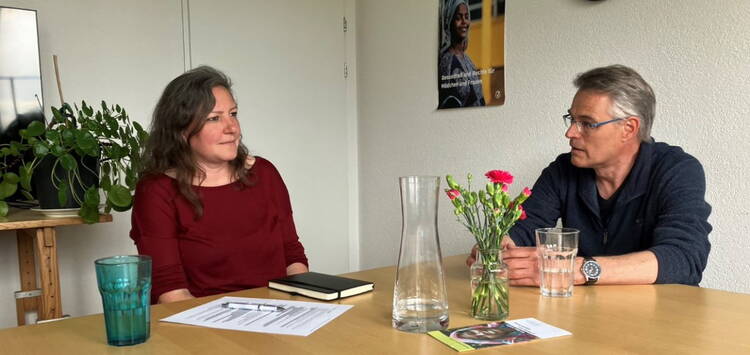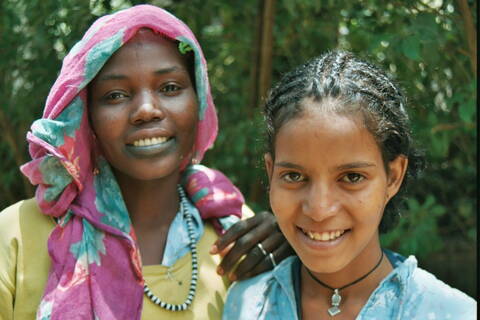International cooperation in transition - an interview on the occasion of the 20th anniversary
International cooperation has changed a lot in the past twenty years. Martin Leimgruber, co-founder of Women's Hope International, and Executive Director Noemi Grossen talk about the social position of women, the responsibility of the state and current challenges.
Martin, you and your wife Claudia founded the association Women's Hope twenty years ago after a three-year stay in Chad. In this context, the name Zenaba comes up again and again. What is behind this story?
One night Zenaba, a young woman in her teens, went to the hospital after several days of labor and when the birth stopped. My wife Claudia was called as midwife. Zenaba was in a critical state of health. The dead child could only be delivered with difficulty using a suction cup. Zenaba survived, but could no longer control the excretion of her feces. She suffered from severe obstetric traumatic injuries.
How did she fare in the aftermath?
After a few days, Zenaba had to leave the hospital to help her relatives with the harvest. In the following months, the young woman often visited Claudia. Together they sat on the mat and drank tea. We had to wash the mat after each visit because it was wet. That's when we realized: Women who leave puddles of urine and spread stench are socially ostracized. They have lost not only their child and their health, but also their dignity.
Affected by encounters like the one with Zenaba, you decided to help women heal obstetric fistula with the newly founded association Women's Hope. In the beginning, the board of directors did all the work on a voluntary basis. Today, thirteen people work part-time for Women's Hope. How do you look at the organization today?
I perceive Women's Hope as a professional organization, with all its advantages and disadvantages. In the past, the emotional connection of everyone involved with Women's Hope was extremely strong. With today's size, that is certainly no longer possible. But it is also clear that with the current size and complexity, paid positions are needed.
Noemi, what is still noticeable today of this strong intrinsic motivation from the founding period?
The insanely great commitment of the board is still impressive today. The motivation of the team is certainly more complex. But here, too: All of them do great things every day with a great deal of conviction.
"The importance of obstetrics reflects the value of women"
Martin Leimgruber, Co-founder of Women's Hope

Martin, you once said that obstetric fistula is also related to the position of women in society. Why?
The importance that society and the state attach to obstetrics expresses the position and value of women in that society. When village communities hesitate until they pool money to transport a woman in labor to the hospital - and when the doctor there then says he will only do a Caesarean section if he receives even more money - this shows what a woman's life is worth.
Today, Women's Hope is increasingly trying to strengthen the social position of women. How do you go about this?
Noemi: This is an extremely complex and lengthy undertaking. Our approaches are certainly more diverse today, and we can approach issues from different angles, partly because we have more resources at our disposal. For example, we place a great deal of focus on awareness-raising work, involve men in our work as much as possible, and hold them accountable. We also try to achieve changes at the structural level.
What does that mean exactly?
Operating on women and empowering health institutions is important. But we also need to address other stakeholders. The government in Chad, for example, has noble plans on paper, but the reality is very different. So we seek dialogue with the local government. We agree, for example, that not only will we contribute something, but that the government will also contribute something. In this way, we hold them accountable. In Afghanistan, for example, negotiations with local authorities are extremely important at the moment. This was the only way to secure at least minimal freedom for women to continue working in the health sector.
What role do local partners play in this?
The most important of all. They are on site, know the context, and can move within it. They are indispensable for the sustainability of the projects.
In the past, people spoke of an aid organization; today, they speak of a non-governmental organization in international cooperation. Does this new choice of words reflect the attitude toward partners just described?
Absolutely. In the last few years, both our organization and international cooperation in and of itself have undergone a relatively significant transformation. Equal partnerships with strong local organizations are extremely important today. Ideally, we who sit at our office desks here in Switzerland will one day be superfluous.
Martin: International cooperation is subject to constant change. What we did twenty years ago, we sometimes look at critically today. And what we do today, we will probably look at critically again in twenty years. The important thing is that we constantly question ourselves, knowing that we always act to the best of our knowledge and belief.
What challenges does Women's Hope currently face?
Noemi: As a rather small organization, we are working in three relatively fragile countries: Afghanistan, Ethiopia and Chad. The situation there can change quickly.
Martin, as founder, what do you wish Women's Hope for the future?
Since the beginning, we have deliberately gone to countries where the need for women is great. I hope that you will continue to do good work in these fragile contexts. And that you succeed, together with your partners, in achieving substantial improvements for girls, women and society as a whole.
Cover picture: Community survey in Chad; Photo: Salomon Djekorgee Dainyoo/WHI/Fairpicture
How it all began:
A midwife and a doctor on mission in Chad
Martin and Claudia Leimgruber founded Women's Hope International in 2003, after a three-year stay in Chad. Tehir encounter with Zenaba had a formative influence.


